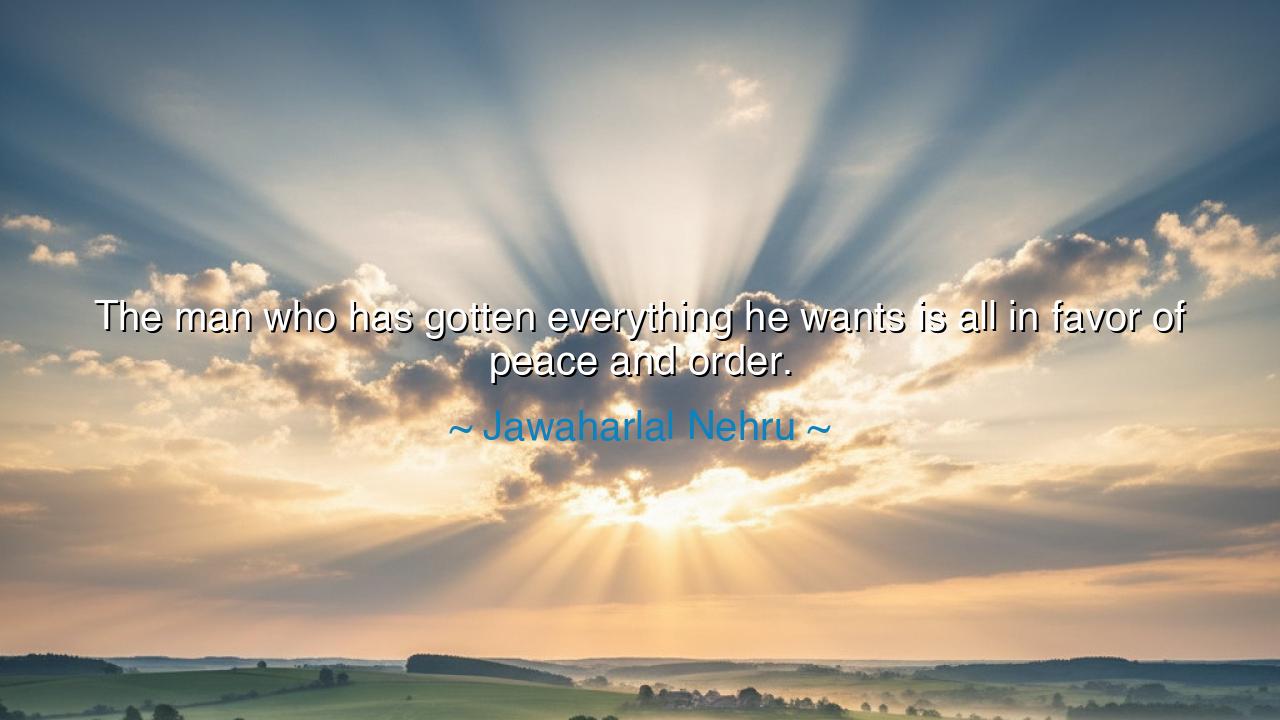
The man who has gotten everything he wants is all in favor of






Hear the piercing words of Jawaharlal Nehru, the first Prime Minister of independent India: “The man who has gotten everything he wants is all in favor of peace and order.” In this saying, there is both irony and truth. For Nehru, who stood at the crossroads of colonial oppression and national liberation, understood the hypocrisy of those who cry for peace and order only after they themselves have secured their desires. Such a man, having gained power, wealth, or privilege, will then preach calm—yet only because it benefits him to preserve the world as it is.
The meaning is clear: true peace and order cannot be defined by the contentment of the few, but by the justice extended to all. When one man has all he seeks, he fears change, for change threatens his comfort. He will speak of order, but his order is the silence of the oppressed. He will speak of peace, but his peace is the absence of challenge to his dominance. Nehru reminds us that peace without justice is not peace, but submission. Order without fairness is not harmony, but chains.
The origin of these words lies in Nehru’s struggle against the British Empire. The colonizers, having taken vast wealth and dominion from India, often spoke of maintaining “peace and order” in the colonies. But this “peace” meant suppressing rebellion; this “order” meant silencing the cry of the people for freedom. To the rulers, who had already gotten everything they wanted, the status quo was perfect. But to the millions who lived under poverty and subjugation, such peace was but the stillness of despair. Nehru’s statement was a blade cutting through this falsehood.
History echoes his wisdom again and again. Consider the French aristocracy before the Revolution. For centuries, they lived in luxury, shielded from hunger and hardship, and so they spoke constantly of order and the divine right of kings. But their order was built on the backs of starving peasants. Only when the storming of the Bastille shattered their illusion did the world see that peace without equality cannot endure. The man who has all will cling to the world as it is, but those who are denied must inevitably rise.
Another tale can be found in the struggles of the American Civil Rights Movement. Many white citizens, comfortable in their privileges, often urged Black leaders to be “patient,” to value “peace and order” over disruption. But Martin Luther King Jr. answered them with the truth: that peace without justice is an illusion, a tranquil surface hiding deep unrest. The oppressed could not wait for the privileged man’s peace; they demanded a peace rooted in dignity and equality. Thus, Nehru’s warning finds voice across continents and generations.
The lesson is sharp: do not mistake the comfort of the privileged for the presence of justice. Do not be lulled into thinking that the absence of conflict means the presence of peace. Instead, ask: who benefits from this order, and who suffers beneath it? True peace is not the silence of the oppressed but the song of the free. True order is not the stifling of change but the balance that comes when justice flows like water.
Therefore, let Nehru’s words endure as a torch. Be wary of those who cry for peace and order while clutching tightly to their gains. Listen instead for the voices of those who have not yet received their share of dignity. In your own life, do not seek comfort at the expense of others, nor demand silence when others are in pain. Strive instead to create a peace that includes all, and an order that lifts the lowly as well as the mighty. For only then will peace be more than a privilege—and order more than a prison.






MD08_ Bui Minh Dung_9A
Nehru’s words make me think about the connection between privilege and the desire for stability. The more a person has, the less they might feel the need to rock the boat. But does this mean that those who have less—who are still striving for their goals—are more likely to challenge the system? Is the call for peace and order really just about maintaining the status quo, or could it be an obstacle to the changes society needs?
MHTran Vo Minh Hang
I find this quote to be an interesting observation on human nature. People who have reached a certain level of satisfaction or success might be inclined to seek stability, but what happens when peace and order stifle new growth or ideas? Is the desire for peace in this context more about preserving personal comfort and control? Does this suggest that those without everything they want may have a stronger drive for change and rebellion?
HVTran Ha Vy
This quote speaks to the complacency that sometimes comes with achieving personal success. It makes me question whether true peace and order can ever exist without struggle. Do people who ‘get everything they want’ see peace as a way to maintain the balance they’ve created, or do they still feel the need for change and improvement? If peace truly is a reward for getting everything one wants, does it come at the expense of progress?
TNLe Thanh Nhan
Nehru’s quote seems to suggest that once someone has achieved their goals, they have no more reason to resist the status quo. I wonder though, how many people who ‘have everything’ actually desire to maintain peace and order? Isn’t it often the case that those in power seek to retain control, sometimes through chaos or manipulation, rather than peaceful coexistence? Could it be that peace is only desirable when there’s nothing left to fight for?